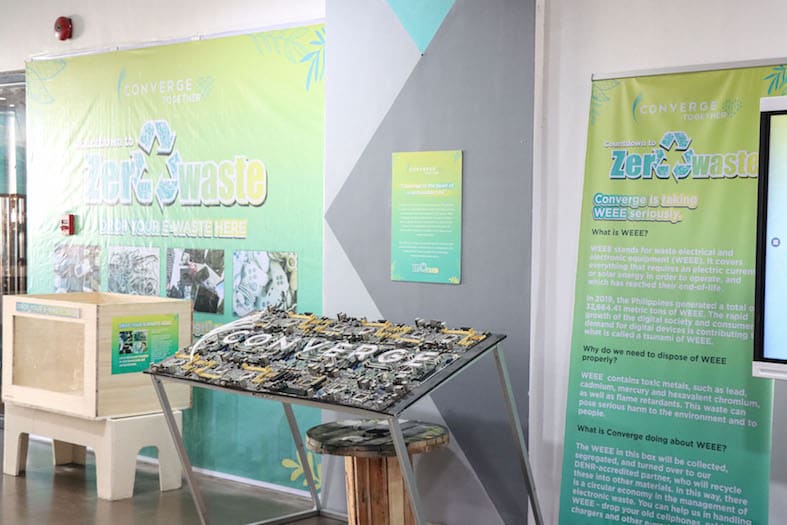“PBBM touts the country’s young, well-trained labor pool in WEF talk“
The Philippines will continue to lean on its young and well-trained workforce to fuel future economic growth, President Ferdinand Marcos Jr. said Thursday, as he noted the country was currently in a “demographic sweet spot” that will play a “major role” going forward.

Apart from being “well-trained and sophisticated,” Mr. Marcos said Filipino workers are also known to be English-speaking and tech-savvy.
“The demographic sweet spot is the period where the optimal number of the country’s population would be in the working age and have few dependents,” he said in an interview in Switzerland, where he is attending the World Economic Forum (WEF) in Davos.
“And the reason that I’m so confident about that is because we have this workforce, we have a very, very good workforce in the Philippines. We have the youngest workforce in Asia. You might be surprised to know, to learn that the average age of Filipino workers is 23 and a half years old. So that is a huge demographic dividend,” Mr. Marcos added.
He said putting a premium on micro, small and medium enterprises (MSMEs) is one of the government’s strategies for the country’s immediate recovery, given that the sector “comprises a large part of the economy.”
“The main concern was jobs,” he said. “We concentrated on the MSMEs – the micro, small [and] medium enterprises because that comprises such a large part of our economy. It’s the same in most ASEAN countries. I think that’s where the growth is coming from,” he said.
The President acknowledged the possible obstacles in developing key areas, which include infrastructure and education, but that the government is upskilling and reskilling the nation’s workforce.
“So that is where my confidence comes from and that is the confidence that I hope to exude sufficiently to bring that confidence also to all of you and all of our potential partners in the world,” he said.
A ranking senator and members of his Cabinet backstopped the President’s claim, saying his attendance at the WEF would boost investments and tourism to the country and thus yield more jobs at home.
“You can expect more investments to come into the country, as President Marcos has been tirelessly working here in Davos and has attended consecutive meetings to create additional investments for our country,” said Senator Mark Villar, who is part of the country’s official delegation to Davos.
“When the additional investments come in, it follows that our country will have more job opportunities and will improve our economy,” added Villar, who was Public Works Secretary in the previous Duterte administration.
In a separate interview, Transportation Secretary Jaime Bautista said the President’s attendance at the WEF is important because it opens up opportunities for the country to entice foreign investors to put their money in the Philippines, particularly in infrastructure development.
“It’s so important to talk about our infrastructure projects, as we invite investors, and this was one point we discussed in a dinner we had with CEOs of big companies, not only in Asia but in Europe,” Bautista pointed out.
Bautista said the Department of Transportation has already received strong support overseas, as former British prime minister Tony Blair showed interest in supporting DOTr’s initiatives, especially railway projects.
For his part, Finance Secretary Benjamin Diokno said the President’s WEF participation will benefit the planned establishment of the sovereign wealth fund, which will become the funding source of the country’s major infrastructure projects.
“We have a lot of infrastructure projects that need funding: we have been borrowing from Japan, China, the World Bank, and ADB (Asian Development Bank). But now, if we have a sovereign wealth fund, we can use that to fund those projects – that is its purpose,” Diokno said in an interview.
The exciting thing is that Mr. Marcos is able to showcase the country on the global stage in his first year in the presidency, the Finance chief said.
“I always say that this is our moment. We have a nice story to tell and it’s just a matter of implementation to improve the lives of Filipinos,” Diokno said.
The President also expressed confidence that the Philippine economy would grow by or even beyond 6.5 percent in 2023.
“Well, our projection is 6.5 percent and we’re still hoping that it will be able to grow beyond that,” Marcos said in a one-on-one dialogue with WEF president Børge Brende.
Mr. Marcos said his administration is focused on attaining a higher economic growth rate to ensure the Philippines’ fast recovery from the COVID-19 pandemic.
“The approach that the Philippines has taken is our lessons learned, the hard lessons learned from the lockdown, from the pandemic, from the height of the pandemic where it became very, very clear where the weaknesses were,” he said.
“The strategy is to have high growth rates to pull us out of that situation. So we’ve done everything,” the President added.
The Marcos administration’s projection is that the Philippine economy would expand by around 6.5 percent this year because of the expected slowdown of the global economy.
Brende said it was “incredible” that the Philippines is one of the best-performing economies among the 10 Association of Southeast Asian Nations (ASEAN) member states.
“I think now, [the] Philippines is the fastest growing of the ASEAN countries,” Brende said.
Reforming and reshaping the global economy, Mr. Marcos said, gave the Philippines an opportunity to come up with appropriate measures to sustain its economic development.
He said the Philippine government is ramping up digitalization efforts to reform the bureaucracy and develop the infrastructure sector by promoting public-private partnerships (PPPs).
The President said his administration is also keeping an eye on the country’s unemployment rate amid reports of recession last year.







